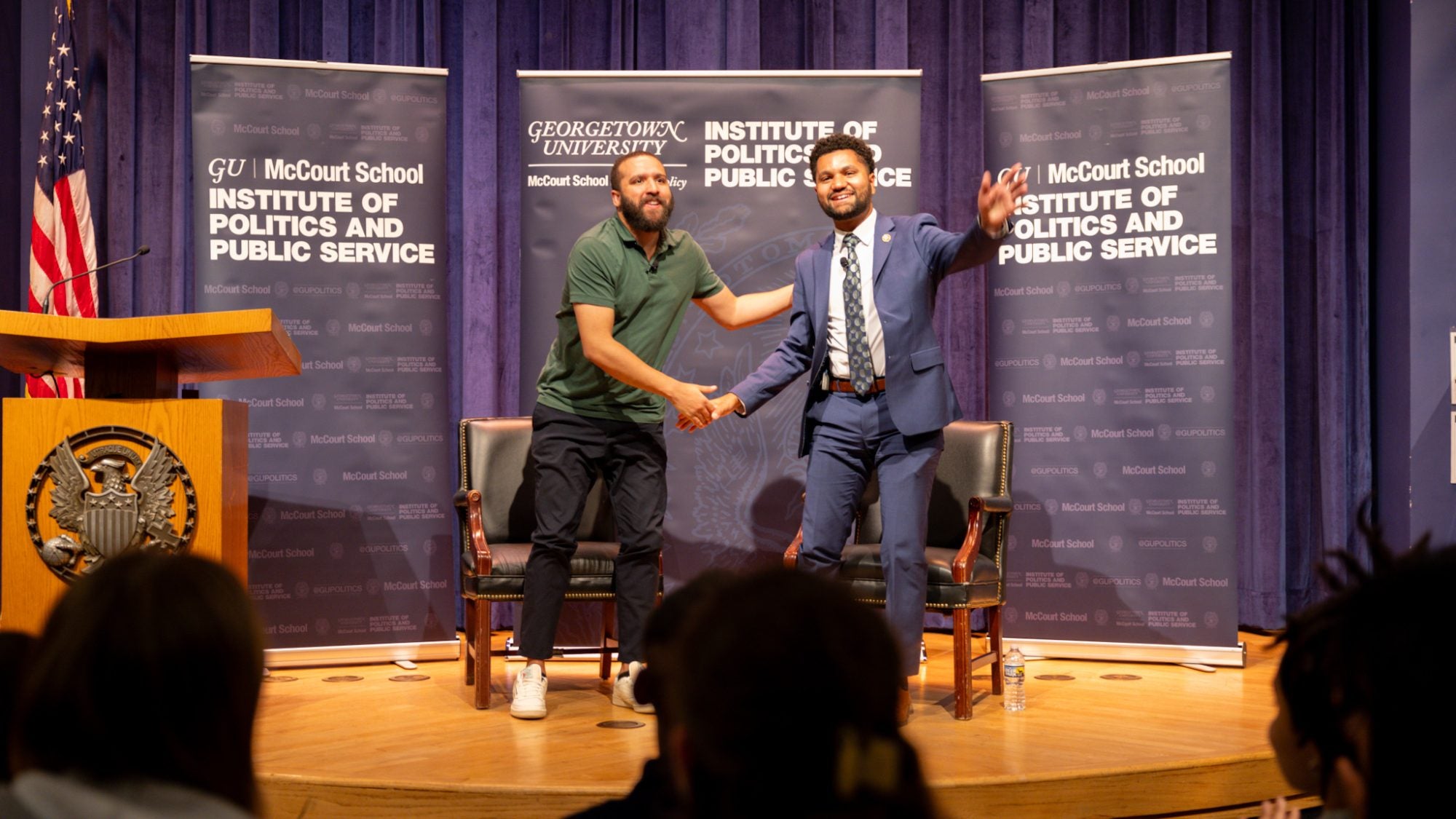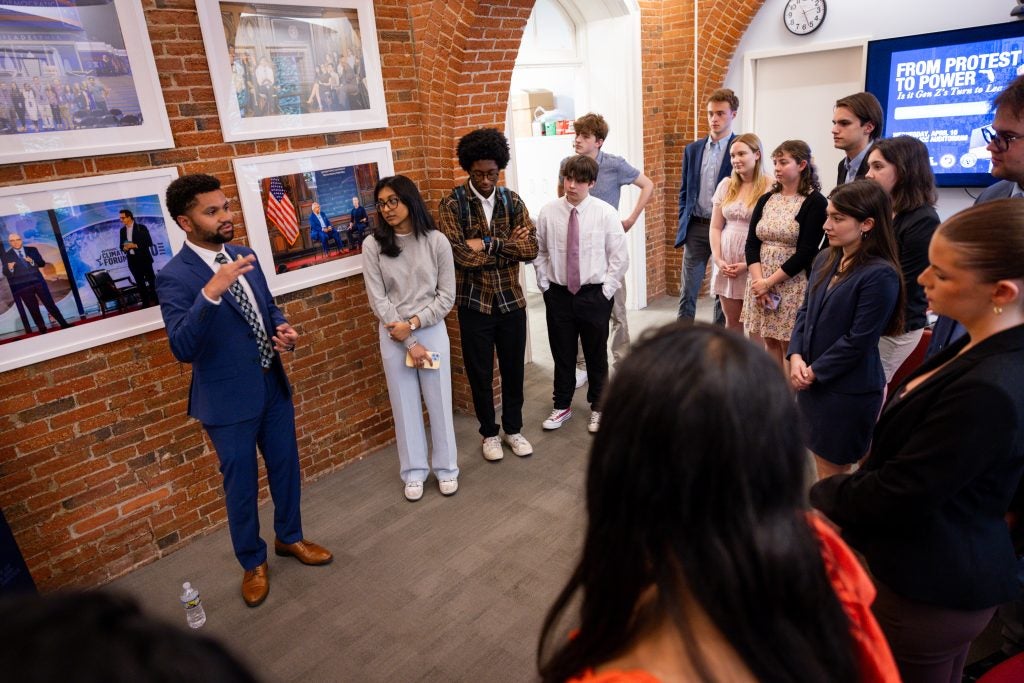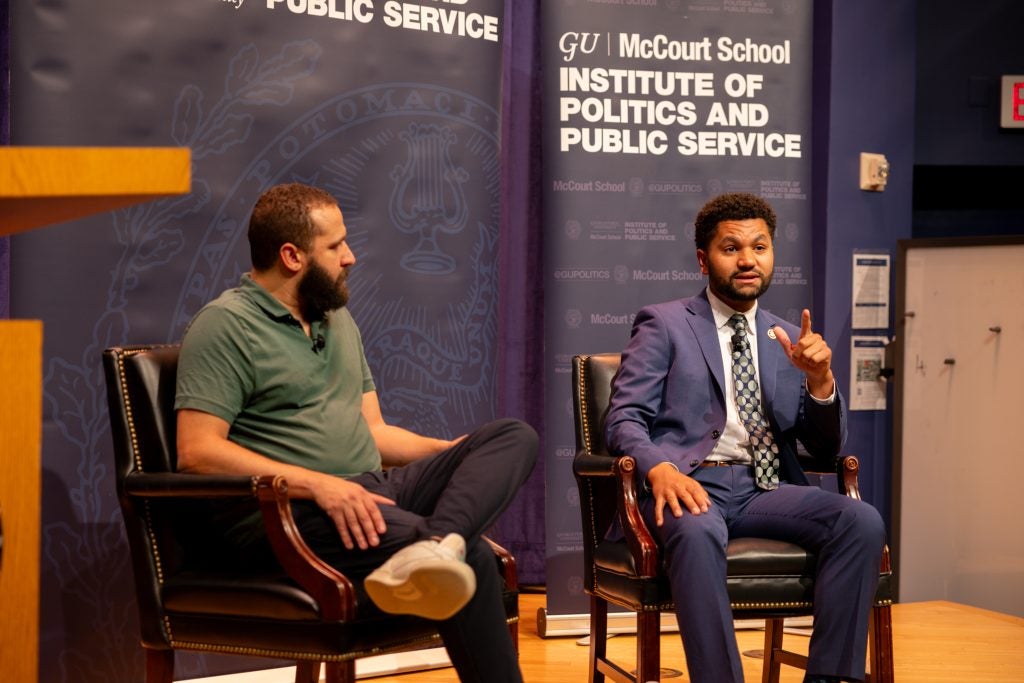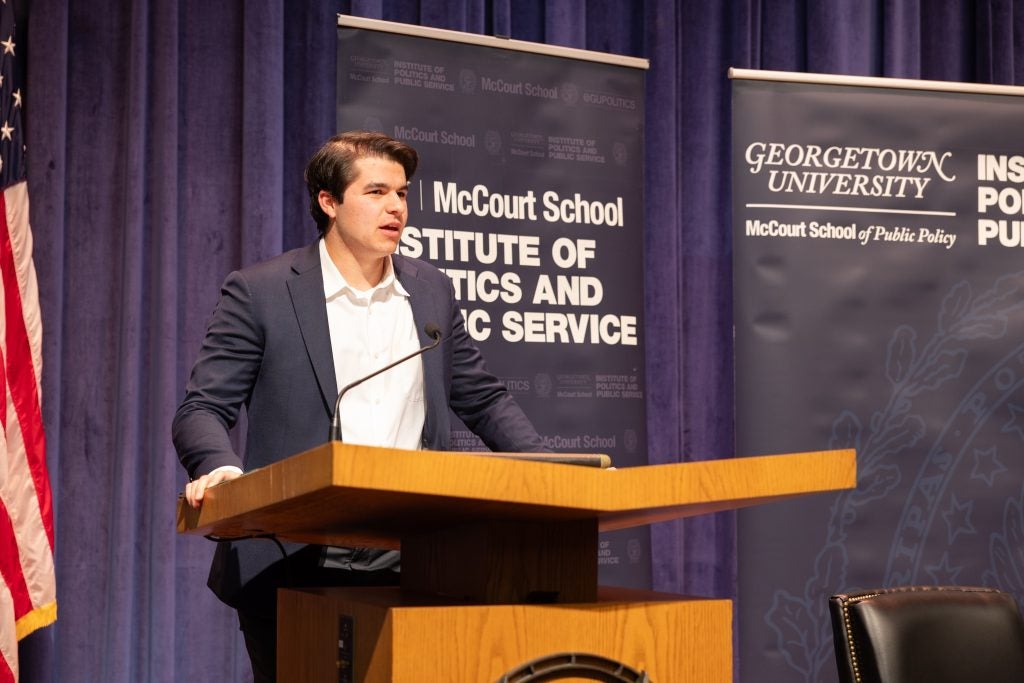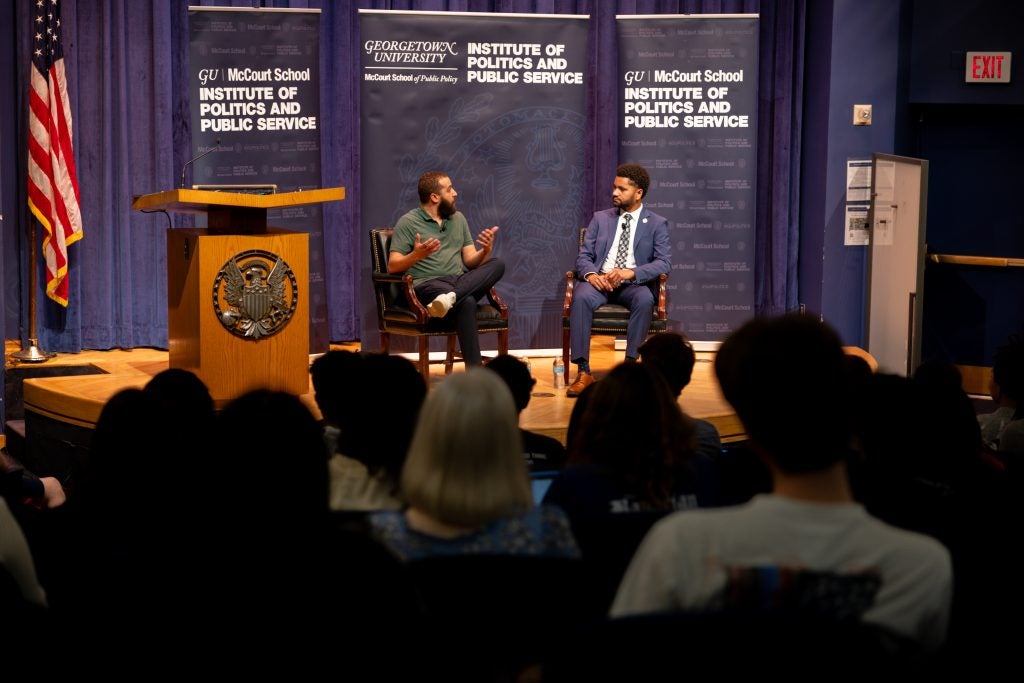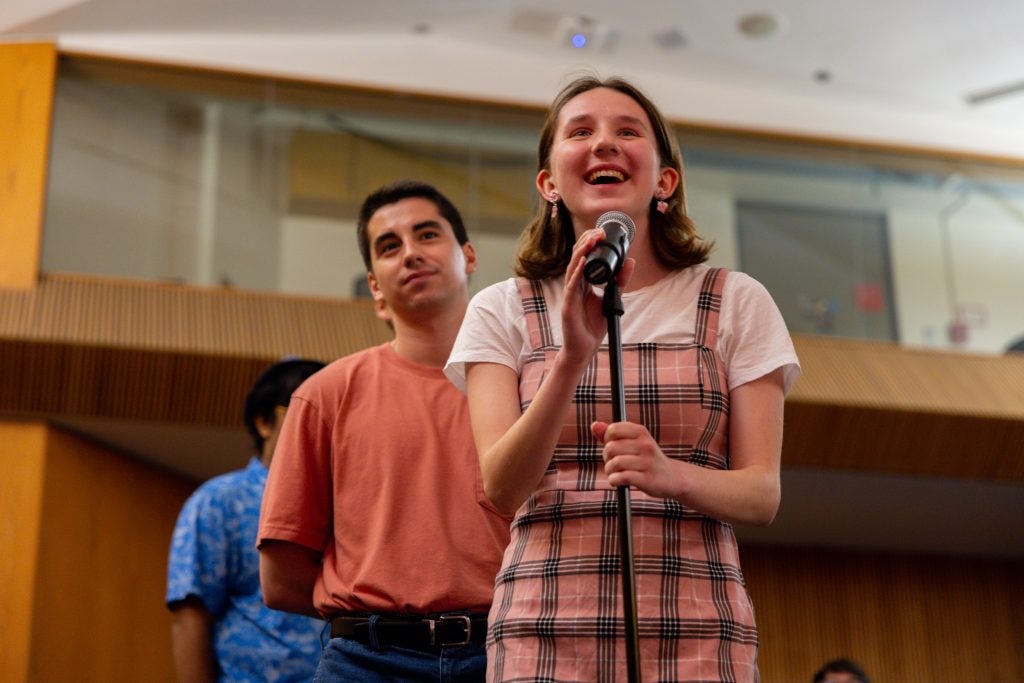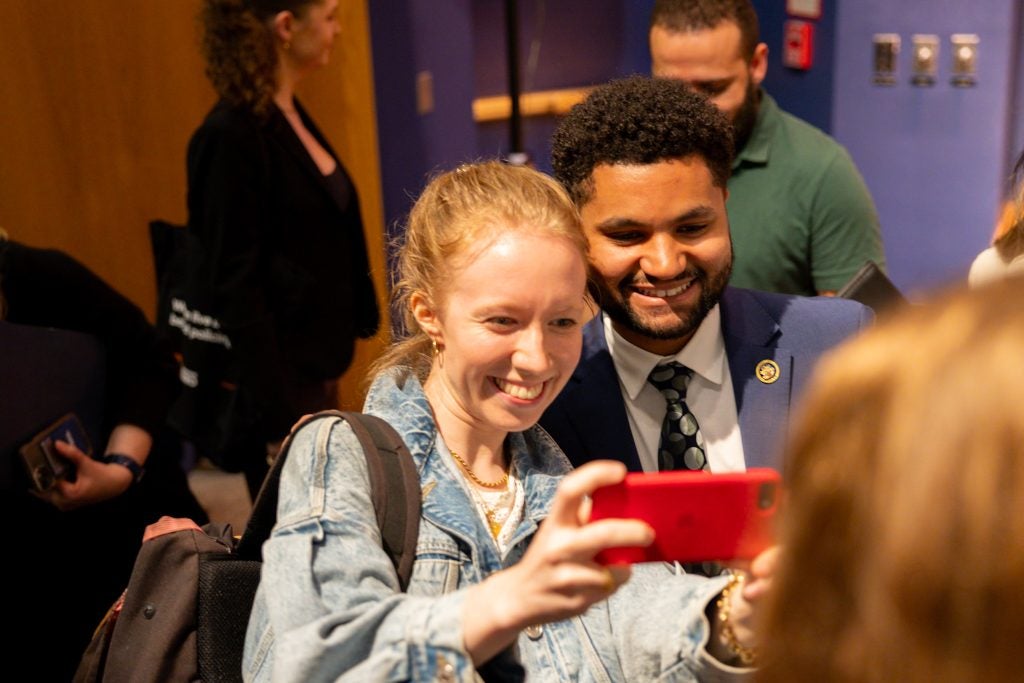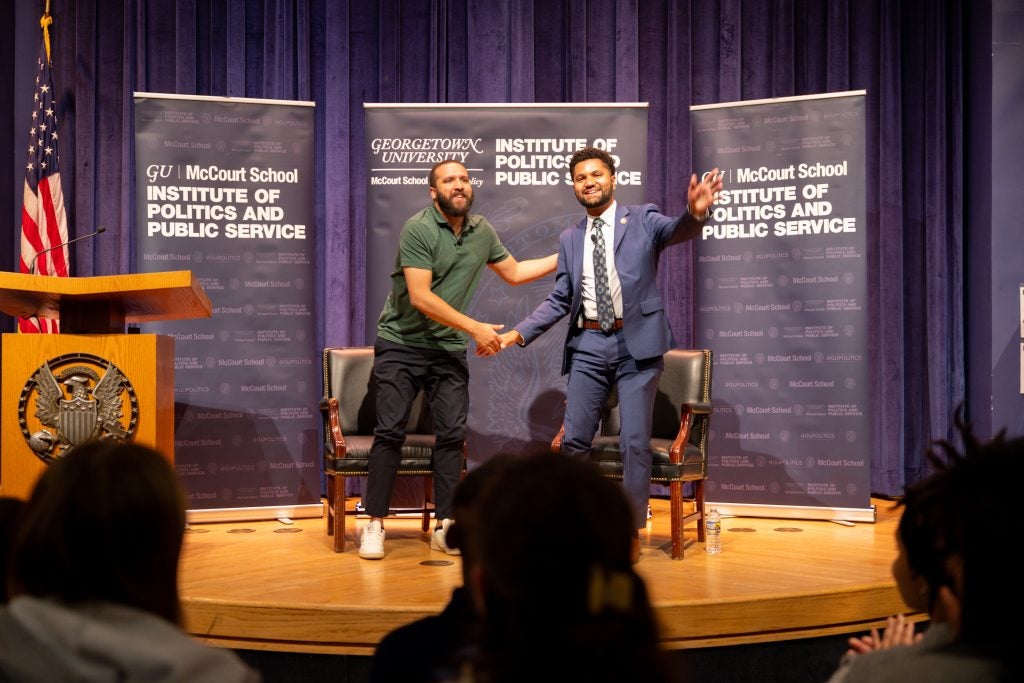On Wednesday, April 10, 2024 students gathered in the ICC Auditorium to hear from U.S. Representative Maxwell Frost (D-FL) about his experience as an organizer and elected official, particularly as the first ever Gen Z member of Congress.
Alex Grass (C’24), a member of the GU Politics Student Advisory Board, introduced Frost, expressing how he is personally inspired by Frost’s activism related to gun violence. Grass also invited GU Politics Spring ‘22 Fellow Wesley Lowery onstage to moderate the conversation.
Lowery jumped into the conversation by asking Frost, “How scared are you for November 2024?”
“I do have big concerns, not just in terms of the presidential election, but there are a lot of elections that matter,” Frost said. “Especially in the state of Florida…When you live in a state where you’re under attack as much as we are… there’s a lot of things on my mind for November.”
Frost talked about some ballot initiatives that Florida citizens will get to vote on regarding abortion rights and marijuana legalization.
“If we do the work, I think we will take back the House of Representatives, I think we will reelect the president and reject Donald Trump for another term,” Frost said. “And I think in the state of Florida, we will pass both of these ballot initiatives.”
On making progress in Florida, Frost added “I believe our state is a progressive state in terms of policy – just not in terms of politics. So I feel optimistic about November.”
“How do you hold your identities as both an organizer, an activist, and also an elected official?” Lowery asked.
“There’s tension, for sure, within myself,” Frost said. “I realized I was running to go into an institution that has caused a lot of harm to people like myself and to people across the country and people around the world…But I also recognize that we need people we trust in these positions,” Frost said.
Lowery next brought up the apathy and frustration experienced by young people facing issues that feel so intractable and challenging. ”How do you combat that?” Lowery asked. Frost emphasized the dangers of demeaning and shaming people for feeling put off.
“I will not shame apathy, but I will inspire action,” he said, reciting a pledge he had involved his constituents in when he first got elected. “That’s really, really important to me, especially for someone who has invested a lot of time and energy into the youth vote.”
Frost talked about the need for compromise and coalition building within the democratic party and especially within his own state. He also emphasized the importance of acknowledging and validating the root causes of people’s concerns. “I don’t have the time to shame, guilt people for not agreeing with me one hundred percent of the time when we have to build a broad coalition.”
Lowery continued on to ask Frost about the next generation of leaders and elected officials, asking him to expand on “the idea that we need leaders who are passionate, not just ambitious.”
“Gen Z is a very entrepreneurial organization,” Frost said, “But oftentimes organizing isn’t about creating something new, but it’s about joining forces with other people.”
He stated the importance of having a passion for policy issues versus just being a young person who gets elected. “That was never what it was about for me,” Frost said.
He elaborated on how his identities are still important to him. “This is the way the world interacts with me because of the color of my skin, because I’m Afro-Latino, because I’m a musician, because I’m an adoptee, because I’m from the South.. and this totality of your identity is an important element of your political view – and it should be, “ Frost said.
“So I’m actually a fan of identity politics when we talk about what identity politics truly is and what it was meant to mean,” Frost said.
Lowery then asked Frost, “What has surprised you about Congress?”
“You hear a lot about the lack of bipartisanship in the institution,” Frost answered. “Oftentimes we blame the people for that… but when you get there you realize that it is also built into the institution. The operation of the institution does not reward bipartisanship,” Frost said.
“There’s a lot of things in the institution that I think need to be changed to help us work together in a better way and see the humanity in each other a little bit more,” Frost said.
Lowery’s last question to Frost was if he had any advice for students who might be future advocates and leaders. Frost elaborated on his various experiences in advocacy.
“The top advice I’d give to everybody here for the longevity of our movement,” Frost said, “is to have respect for all the different types of organizing people do…Whatever you choose to do, be proud of it and know it is important to the greater timeline of justice for our people and the world we want.”
Students then had the opportunity to ask Rep. Frost questions.
Eli Goldstein, a student from nearby American University, asked Frost how to get young, apathetic voters to show up.
Frost emphasized seeing the bigger picture in terms of motivating people and having a successful movement. He talked about knowing when to step back and not push people away.
“It’s important to see that bigger picture or else it’s easy to, you know, feel really hopeless about the situation,” Frost said.
Anshuraj Pal (C ‘27) asked about Florida’s contradictory politics. “Why does Florida have such a huge difference in what its citizens believe?”
Frost talked about the power of Republican messaging in Florida where the GOP creates, “a sense and an environment of ambiguity that is not about specific policy proposals, but is a politics based on vibes and emotion…That’s really powerful, it creates a culture.” Frost said.
Frost emphasized the importance of tying important policy issues back to candidates.
“The strength of all these bills that the Republican party has passed in Florida… is the ambiguity of the legislation to do whatever they want,” Frost added.
Frost concluded the event by addressing the challenges of getting traction and funding to run for office and reflected on the difficulties he faced during his campaign.
“There are real institutional barriers that keep young people from running for office,” Frost said. “We have to fix those.”
This article was written by Jane Wright (MPP’25), a first-year student in the McCourt School of Public Policy.
Watch the full recording of the event below.
